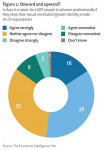Economist Intelligence Unit, “New member states to benefit from significant new EU funding for innovation and technology projects in 2007-13”
Even better, the EU and the national authorities have worked to streamline the processes for accessing these funds. This will help improve fund absorption·which was low in the 2004-06 period. There will also be differences in the way the money is spent in 2007-13, with the EU having significantly increased the emphasis on competitiveness-enhancing and growth-creating measures.
“This is good news for firms in the ICT arena,” says Matthew Shinkman of the Economist Intelligence Unit, the report’s author. "The new EU priorities will see spending on innovation and ICT-related projects increase substantially. The final amounts are still being negotiated, and the lack of a standardised framework for fund allocations makes a concise figure hard to determine. However, despite some pressure in EU10 countries to focus investment elsewhere·in health and environmental infrastructure for example·there is little doubt that ICT spending will be in the tens of billions of euros in 2007-13".
Key findings of the report include:
· Big money: The EU10 are eligible for over ?175bn (US$233bn at forecast average 2007 exchange rate) in structural funding in 2007-13, or almost ?2,000 (US$2,660) per capita. This marks a massive increase from the amount on offer in 2004-06. Member states are required to co-finance the funding, and are in many cases insisting that companies who receive funds co-invest as well, so that the ultimate stimulus to the economies of these countries has the potential to be huge.
· Smoothing the way: A number of changes have been made in the rules for accessing EU funds, which both the European Commission and the member states hope will result in more of the money being spent. These include an increase in the size of individual grants that must be vetted on competition grounds, and the removal of annual earmarks on spending. Jeff Clark, Intel’s Director of European Union Region, adds: "Better cooperation between governments and the private sector on joint programmes to extend technology adoption can help strengthen competitiveness in Central and Eastern Europe. At Intel we believe that better usage of EU funds on innovation-related projects will also have a big impact on the everyday lives of people living in the region." The EU10 have also been busy building new institutions and training staff to improve their “absorption capacity”·the ability to manage and organise the spending effectively.
· Innovation is in: The new financial perspective will see an increased emphasis on innovation-related measures, as part of the EU’s push to improve the competitiveness of the European economy and create more jobs. Observers have suggested that funds available for ICT-related projects could top ?30bn·in addition to national and private co-financing. “This wave of EU funding will support competitiveness across the Central and Eastern Europe region and contribute to a thriving knowledge economy. This will in turn stimulate innovation, support productivity and increase the demand for IT skills. Together with our partners, we at Microsoft are optimistic about the potential of the ICT sector in the new member states,” says Vahe Torossian, Regional Vice President for Microsoft Central and Eastern Europe.
Plugging in: EU funds and technology in the EU’s new member states is available free of charge at: www.eiu.com/PluggingIn
Notes for editors
About the Economist Intelligence Unit
The Economist Intelligence Unit is the world leader in global business intelligence. It is the business-to-business arm of The Economist Group, which publishes The Economist newspaper.
The Economist Intelligence Unit provides geopolitical, economic and business analysis on more than 200 countries, as well as strategic intelligence on key industries and management practices. With over 300 full-time professionals in 40 offices around the world, supported by a global network of more than 700 contributing analysts, the Economist Intelligence Unit is widely known for its unparalleled coverage of major and emerging markets. More information about the Economist Intelligence Unit can be found on the Web at www.eiu.com.
웹사이트: http://www.eiu.com
연락처
Edgar Fernandez
Marketing Manager, Asia-Pacific
(852) 2585 3826 이메일 보내기
Fax: (852) 2802 7007
이 보도자료는 Economist Intelligence Unit가(이) 작성해 뉴스와이어 서비스를 통해 배포한 뉴스입니다.



